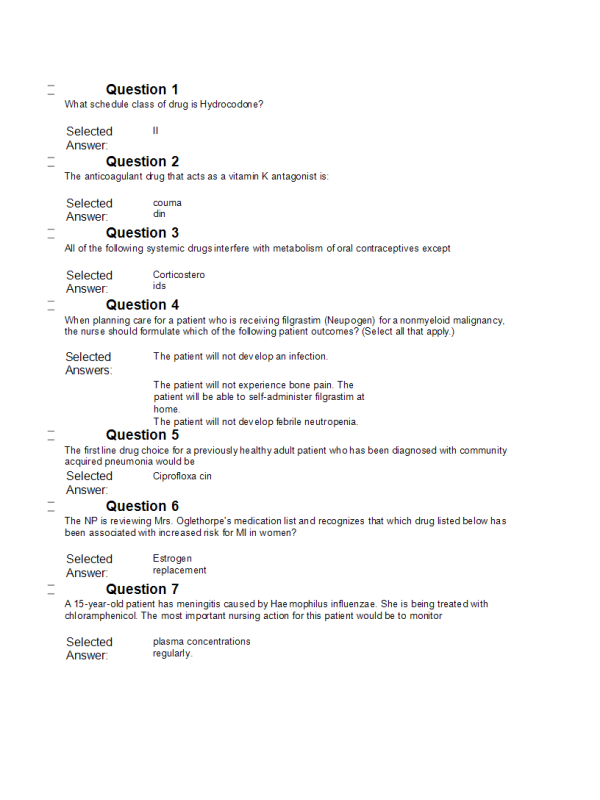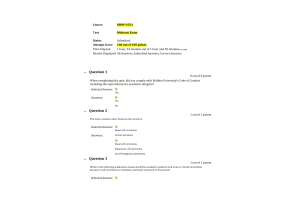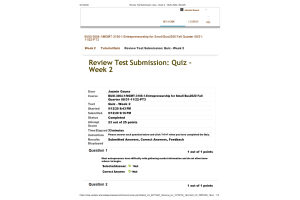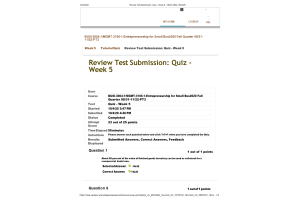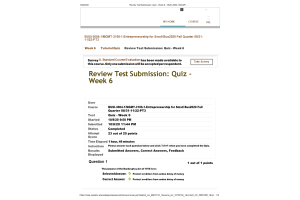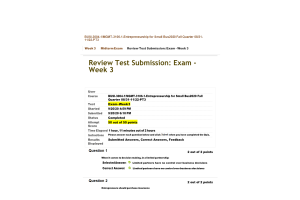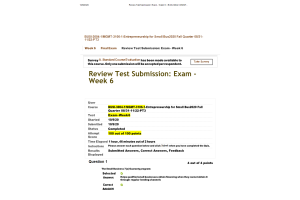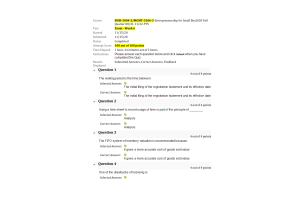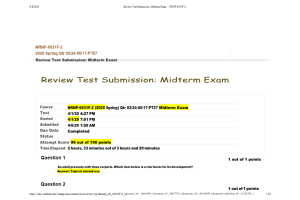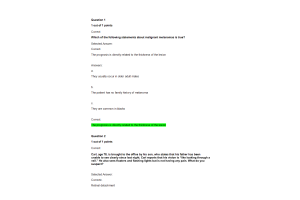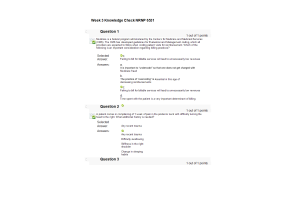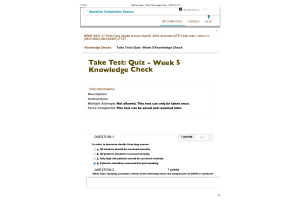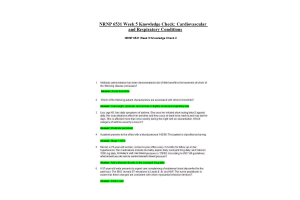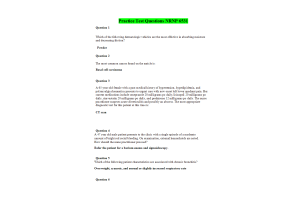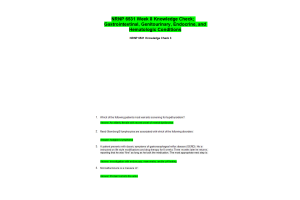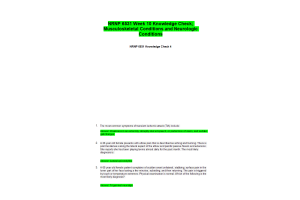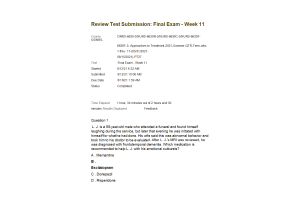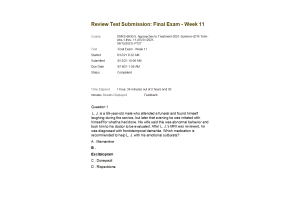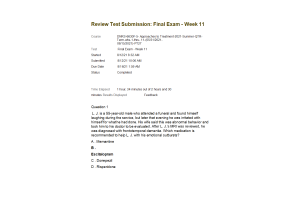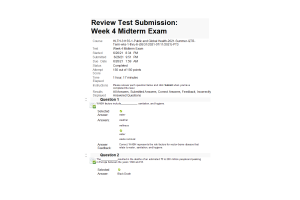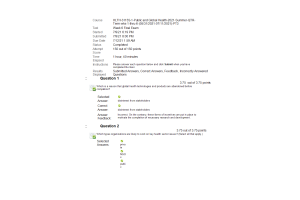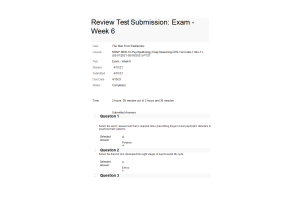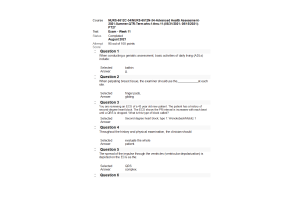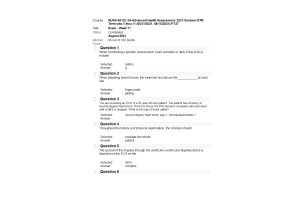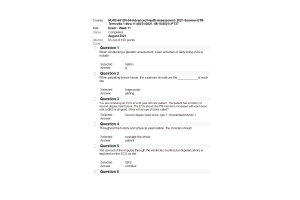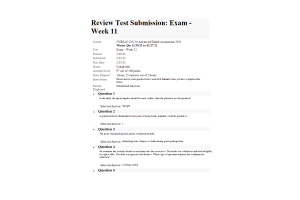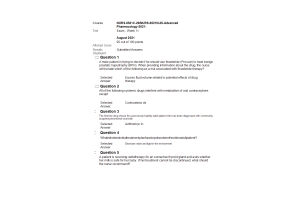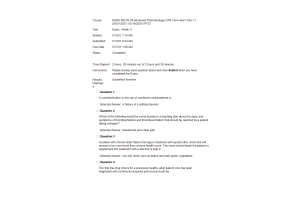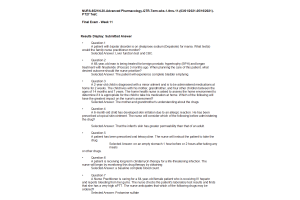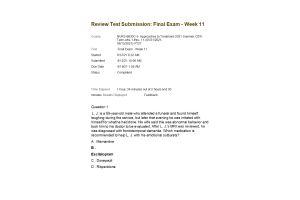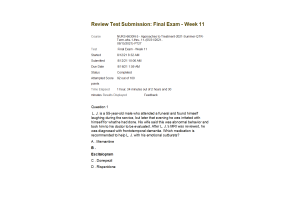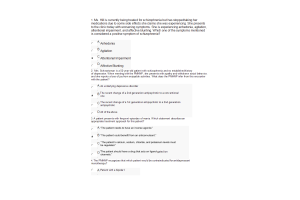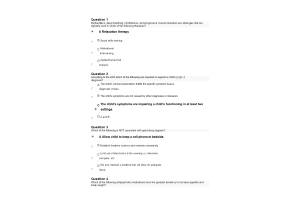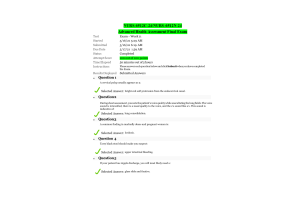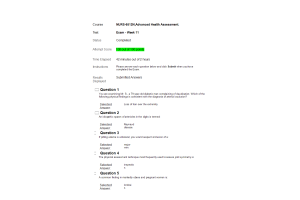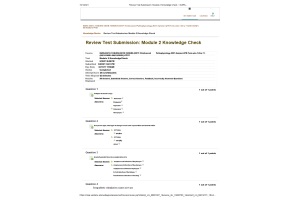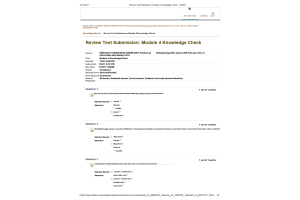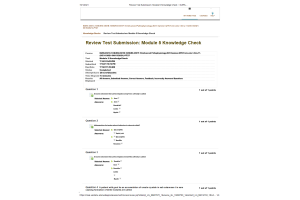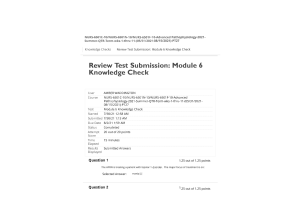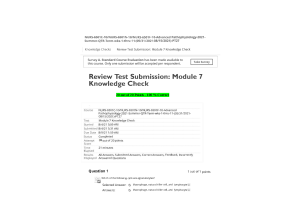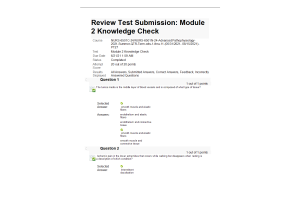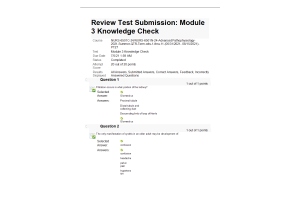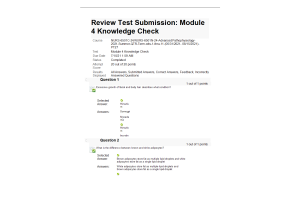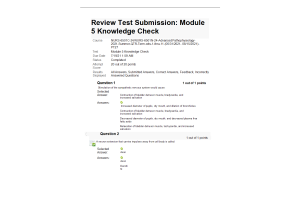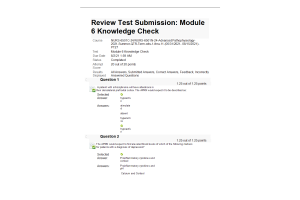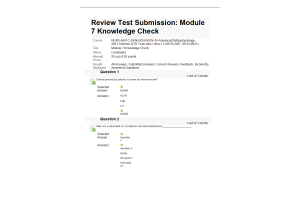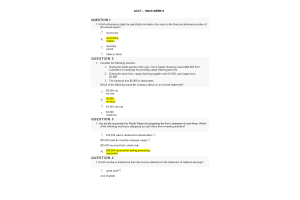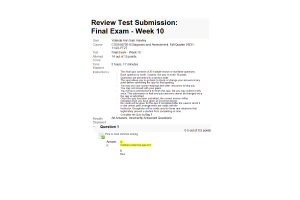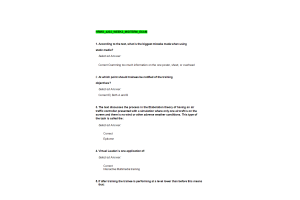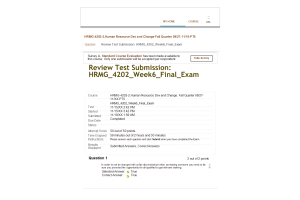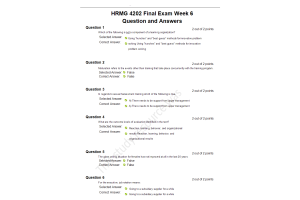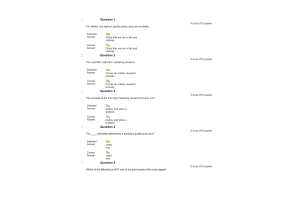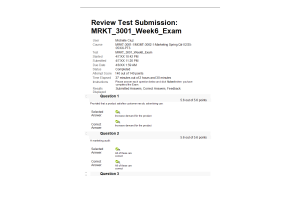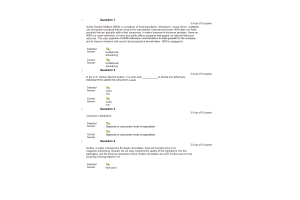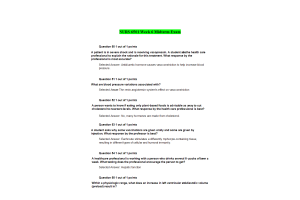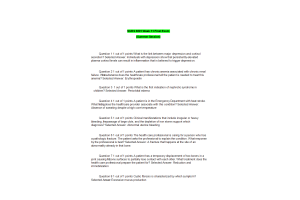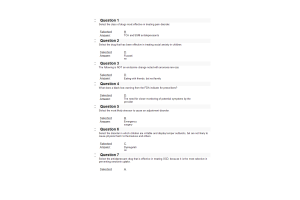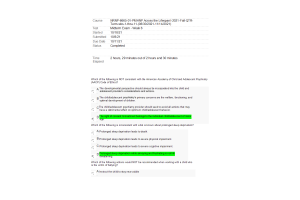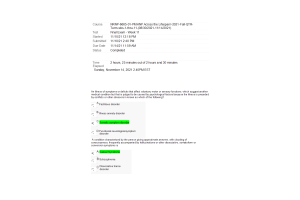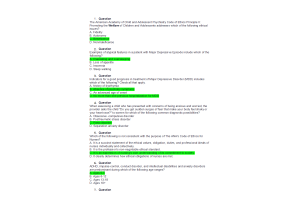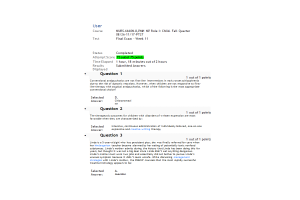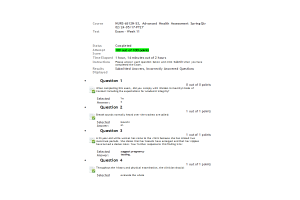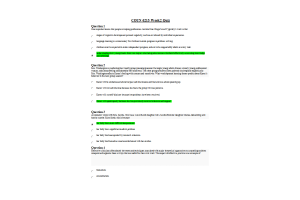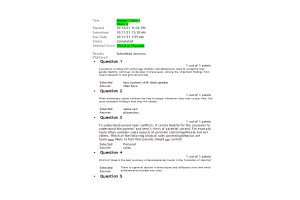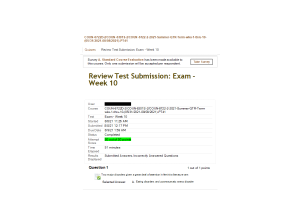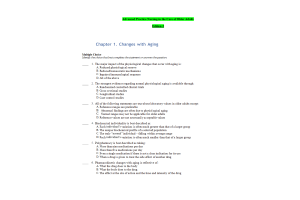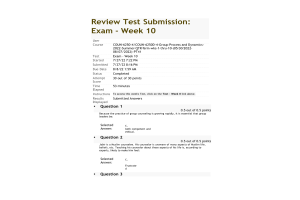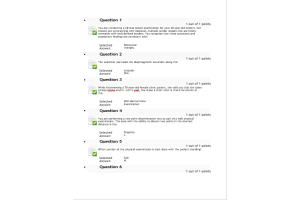NURS 6521 Week 11 Final Exam (Score 100 out of 100 Points)
- $55.00
- Question: What schedule class of drug is Hydrocodone?
- Question: The anticoagulant drug that acts as a vitamin K antagonist is:
- Question: All of the following systemic drugs interfere with metabolism of oral contraceptives except
- Question: When planning care for a patient who is receiving filgrastim (Neupogen) for a nonmyeloid malignancy, the nurse should formulate which of the following patient outcomes? (Select all that apply.)
- Question: The patient will not experience bone pain. The patient will be able to self-administer filgrastim at home.
- Question: The first line drug choice for a previously healthy adult patient who has been diagnosed with community acquired pneumonia would be
- Question: The NP is reviewing Mrs. Oglethorpe's medication list and recognizes that which drug listed below has been associated with increased risk for MI in women?
- Question: A 15-year-old patient has meningitis caused by Haemophilus influenzae. She is being treated with chloramphenicol. The most important nursing action for this patient would be to monitor
- Question: A Nurse Practitioner is explaining the use of acyclovir therapy to a 72-year-old man. Nephrotoxicity is discussed as a major adverse effect in older patients. To minimize the risk of the patient developing this adverse effect, the nurse will advise him toQuestion: John, the Nurse Practitioner is prescribing Fosamax for his patient. Bisphosphonate administration education includes
- Question: Jacob was eating cheese and drinking beer. Thirty minutes Later, he developed severe hypertension, diaphoresis, Flushing, and muscle rigidity. He may have been taken which drug?
- Question: A Nurse Practitioner is caring for a patient who is on amphotericin B. On morning rounds the patient reports weakness, numbness, and a tingling sensation in his feet. What would be a priority action by the nurse?
- Question: A Nurse Practitioner is caring for a patient who is at 28 weeks' gestation and is receiving terbutaline (Brethine) to control preterm labor. Which of the following assessment parameters should the nurse prioritize?
- Question: A Nurse Practitioner is assessing a patient who has chronic lymphoblastic myelogenous leukemia. The treatment plan includes hydroxyurea (Hydrea). The nurse will assess the patient for which of the following?
- Question: A 30-year-old woman who is in the first trimester of pregnancy has presented to her primary care provider with a 4-day history of a reddened, itchy left eye that is crusted with purulent exudate. The clinician suspects a bacterial, rather than viral, etiology. How will the patient's pregnancy affect the potential use of ciprofloxacin to treat her conjunctivitis?
- Question: A 43-year-old man has been diagnosed with active TB. He is prescribed a multiple drug therapy, including INH and rifampin. A priority assessment by the nurse will be to monitor which combination of laboratory test results?
- Question: A patient with chronic heart failure has begun treatment with epoetin alfa, which she will receive in her own home from a home health nurse. The nurse should teach the patient to supplement this treatment with a diet that is high in
- Question: A 7-year-old child has been taking tetracycline for a bacterial infection. The nurse will be sure to inform the parents that this drug could cause
- Question: Intravenous carmustine has been prescribed for a patient with cancer. The nurse should help relieve the discomfort of pain and burning during the infusion by
- Question: A Nurse Practitioner is caring for a 64-year-old female patient who is receiving IV heparin and reports bleeding from her gums. The nurse checks the patient's laboratory test results and finds that she has a very high aPTT. The nurse anticipates that which of the following drugs may be ordered?
- Question: A patient will soon begin targeted therapy as a component of her treatment plan for chronic leukemia. The nurse is conducting health education about this new aspect of the patient's drug regimen and the patient has asked about the potential side effects of treatment. How should the nurse best respond?
- Question: A patient is taking etoposide for a testicular tumor refractory to treatment. The nursing assessment reveals that he is also taking warfarin. The nurse must carefully monitor for which of the following?
- Question: Morphine has been prescribed for a 28-year-old man with severe pain due to a back injury. The nurse will advise the patient to avoid
- Question: Laboratory testing has confirmed that a patient has chloroquine-resistant malaria and the patient's physician has prescribed quinine along with an adjunctive drug. The nurse should question the physician's order if the patient has a history of
- Question: The clinical nurse educator who oversees the emergency department in a children's hospital has launched an awareness program aimed at reducing drug errors. What measure addresses the most common cause of incorrect doses in the care of infants and children?
- Question: Whatisthebestinitialtreatmentplanforaslepdisorderintheolderadultpatient?
- Question: A 29-year-old woman who is morbidly obese has recently begun a comprehensive, medically-supervised program of weight reduction. Prior to adding dextroamphetamine (Dexedrine) to her regimen, the patient should be questioned about her intake of
- Question: A Nurse Practitioner is obtaining baseline physical data from a 7-year-old patient who is to be started on dextroamphetamine for ADHD. After obtaining vital signs, height, and weight, the nurse will prepare the patient for an
- Question: A patient has been prescribed oral tetracycline. The nurse will instruct the patient to take the drug
- Question: Ms. TW is a 47 year old female with known rheumatoidarthritis(RA). She was splacedonprednisone 5mgPOqd. Inteaching the patient about her medication, it would be important for the nurse practitioner to include what information?
- Question: The maximum amount of acetaminophen that can be taken per day is
- Question: A 68-year-old man is being treated for benign prostatic hypertrophy (BPH) and began treatment with finasteride (Proscar) 3 months ago. When planning the care of this patient, what desired outcome should the nurse prioritize?
- Question: A male patient is trying to decide if he should use finasteride (Proscar) to treat benign prostatic hypertrophy (BPH). When providing information about the drug, the nurse will include which of the following as a risk associated with finasteride therapy?
- Question: A 46-year-old man is receiving a quinupristin/dalfopristin IV infusion for a life-threatening infection. Which of the following would be most important for the nurse to monitor?
- Question: Mr. CW has his routine appointment today in your clinic. He has been taking 10 mg of prednisone per day for the past six months. He should be assessed for
- Question: A patient is prescribed ganciclovir to treat a CMV infection. An oral dosage is prescribed. To help increase bioavailability of the drug, the nurse will encourage the patient to take the medication
- Question: Alendronate (Fosamax) is prescribed for a 67-year-old postmenopausal woman. In order to help prevent gastrointestinal distress, the nurse will advise the patient to
- Question: A 20-year-old female patient is receiving topical clindamycin for acne vulgaris. She develops a rash and urticaria along with severe itching where the medication is applied. The nurse will formulate which of the following nursing diagnoses for the patient?
- Question: A Nurse Practitioner is explaining to the parents of a 6-year-old child suffering from angina why nitroglycerin patches for chest pain would not be appropriate. Which of the following will the nurse include in an explanation?
- Question: A patient has acquired primary hypogonadism and has been prescribed testosterone transdermal (Androderm) patches. When educating the patient on how to administer the drug, the nurse will instruct him to
- Question: recurrent cystitis. Because of the patient's history, the nurse would be sure to discuss with the woman the use of
- Question: A patient has been admitted to the critical care unit with a diagnosis of peritonitis that has necessitated treatment with gentamicin. As a result, the care team should be cautious when concurrently administering other medications that may cause
- Question: A patient is to begin taking tobramycin (Nebcin) for a nosocomial infection. Which of the following assessments should the nurse prioritize?
- Question: A patient is taking rifampin (Rifadin) for active TB. When discussing this drug with the patient, the nurse should stress that
- Question: The NP is considering a medication to treat Ms. Robert's Urinary Tract Infection. The NP knows that Trimethoprim sulfamethazole (Bactrim) Is contra indicated in which of the following conditions:
- Question: A 33-year-old man has developed acute gouty arthritis. He has been prescribed colchicine. When developing a care plan for this patient, which factor will be most important for the nurse to consider?
- Question: A 13-year-old female took a weight loss drug that activated the sympathetic nervous system. Which of the following assessment findings would the nurse expect?
- Question: The nurse practitioner has prescribed elemental iron 6mg/kg/day in three divided doses for a toddler diagnosed with iron-deficiency anemia. What instructions would the family nurse practitioner include for the parents?
- Question: A Nurse Practitioner is discussing with a 58-year-old male patient the causes of erectile dysfunction in men over 50 years of age. Which of the following will the nurse inform the patient is the primary physical cause of erectile dysfunction of men in this age group?
- Question: A male patient has been brought to the emergency department during an episode of status epilepticus. Diazepam is to be administered intravenously. The APRN will be sure to
- Question: A 66-year-old man has made an appointment with his primary care provider to discuss his recent erectile dysfunction (ED) and has requested a prescription for tadalafil (Cialis) based on television commercials he has seen. What characteristic of this patient would most likely contraindicate the use of tadalafil for his ED?
- Question: Mr. Lepp is a 63-year-old man who was diagnosed with colon cancer several weeks ago and who is scheduled to begin chemotherapy. He reports to the nurse that he read about the need for erythropoietin in an online forum for cancer patients and wants to explore the use of epoetin alfa with his oncologist. Which of the following facts should underlie the nurse's response to Mr. Lepp?
- Question: A 60-year-old patient experienced a sudden onset of chest pain and shortness of breath and was subsequently diagnosed with a pulmonary embolism in the emergency department. The patient has been started on an intravenous heparin infusion. How does this drug achieve therapeutic effect?
- Question: Ms. Lewis Is in 74-year-old female who presents to your clinic for routine visit today. You review her medical record and notice she is prescribed aspirin therapy. You provide patient education regarding the signs of aspirin toxicity. An early sign of aspirin toxicity is:
- Question: A nurse practitioner orders a single dose of 2 g Metronidazole orally. How many milligrams will the patient receive in one dose?
- Question: A male patient is receiving heparin by continuous intravenous infusion. The nurse will instruct the patient and family members to report which of the following should it occur?
- Question: Cindy has been on Citalopram (Lexapro) For a year and is willing to try tapering off of the selective serotonin reuptake inhibitor. What is the initial dosage adjustment when tapering off antidepressants
- Question: Black cohosh is an herb that is commonly used for
- Question: Which antibiotic is most frequently associated with "Red man Syndrome"
- Question: A patient with a recent diagnosis of chronic myelogenous leukemia (CML) is discussing treatment options with his care team. What aspect of the patient's condition would contraindicate the use of cyclophosphamide for the treatment of leukemia?
- Question: A man is prescribed ciprofloxacin to treat a sexually transmitted infection. The nurse will instruct the patient to
- Question: A school nurse has been teaching high school students about the risks associated with marijuana use. However, the nurse has been met with considerable skepticism on the part of students, most of whom believe that marijuana is a benign drug. Which of the following teaching points should the nurse provide?
- Question: An older adult woman has been diagnosed with acute lymphoblastic leukemia (ALL) and her care team has identified potential benefits of imatinib. Which of the following characteristics of this patient's current health status may preclude the use of imatinib?
- Question: Alprostadil (Caverject), a drug used to treat erectile dysfunction, has been prescribed to a 42-year-old patient. When providing education to the patient and his wife, the nurse should inform the wife about which of the following adverse effects?
- Question: A nurse practitioner has been assigned to a 55-year-old woman who has a malignant brain tumor. The patient is receiving her first dose of carmustine. It will be critical for the nurse to observe for which of the following?
- Question: A Nurse Practitioner is working with a 16-year-old pregnant teen and assessing for behavior that may put the baby at risk. The most important assessment the nurse can make is
- Question: A patient with non-Hodgkin's lymphoma (NHL) will be starting a course of doxorubicin shortly. When planning this patient's care, what nursing diagnosis should the nurse prioritize?
- Question: A Nurse Practitioner is instructing a 19-year-old female patient on the use of fluconazole for candida vaginitis. A teaching priority will be to
- Question: On the advice of her sister, a 52-year-old woman has visited her nurse practitioner to discuss the potential benefits of hormone replacement therapy in controlling the symptoms of menopause. Which of the following responses by the nurse is most appropriate?
- Question: A 56-year-old woman will soon begin treatment of her overactive bladder with tolterodine (Detrol). What patient teaching should the nurse provide to this woman?
- Question: Which adverse reaction is common in the patient taking buspirone?
- Question: A 2-year-old child is diagnosed with a minor ailment and is to be administered medications at home for 2 weeks. The child lives with his mother, grandmother, and four other children between the ages of 14 months and 7 years. The home health nurse is asked to assess the home environment to determine if it is appropriate for the child to take his medication at home. Which of the following will have the greatest impact on the nurse's assessment?
- Question: A 3-year-old boy has developed otitis media and requires antibiotics. In order to increase the chance that the boy will take his prescribed medication, the nurse should
- Question: A Nurse Practitioner is caring for a 46-year-old female patient who is taking paclitaxel for ovarian cancer. Two or three days after the infusion of the drug, the nurse must closely monitor for which of the following?
- Question: A pregnant patient who has diabetes has been admitted to the hospital to begin labor. Since the patient has diabetes, the physician has decided to use oxytocin (Pitocin) to initiate labor contractions. When talking to the patient about the adverse effects of the drug, the nurse should understand that the most common adverse effects of the drug include
- Question: A 13-year-old patient has juvenile arthritis. He has recently had oral surgery and was told by the surgeon to take aspirin for the pain. The APRN will monitor for which of the following?
- Question: A Nurse Practitioner who provides care on a pediatric medicine unit has conducted a medication reconciliation of a recently-admitted patient. In light of the fact that the child takes methylphenidate (Ritalin), the nurse is justified in considering a history of what health problem?
- Question: A male patient is taking finasteride for BPH. Which of the following will the nurse evaluate at each clinic visit?
- Question: A 6-month-old child has developed skin irritation due to an allergic reaction. He has been prescribed a topical skin ointment. The nurse will consider which of the following before administering the drug?
- Question: A patient with AIDS has developed a number of secondary infections in recent weeks, including Kaposi's sarcoma. As a result of this most recent diagnosis, his care team has opted to begin treatment with interferon alfa- 2a. The nurse is aware that this drug will address the etiology of Kaposi sarcoma by
- Question: How do bisphosphonates Treat osteoporosis?
- Question: What is the minimum inhibitory concentration (MIC)
- Question: The laboratory monitoring required when a patient is on a selective serotonin reuptake inhibitor is?
- Question: Mr. Asberry is taking Levofloxacin for his sinusitis. He calls your clinic and reports some pain just above the heel of his left foot. The NP should:
- Question: The Nurse Practitioner has established peripheral IV access and begun an infusion of magnesium sulfate on a 29-year-old antepartum patient who is 35 weeks pregnant. Which of the following assessment findings most likely prompted the patient's physician to order magnesium sulfate for this patient?
- Question: A patient reports to a clinic with complaints of breast tenderness, a right lumpy breast, and no breast discharge. The breast tenderness occurs primarily during her menstrual cycle. The nurse practitioner probably suspects
- Question: Gold compounds are contraindicated in patients with all of the folowing conditions except:
- Question: A child is taking permethrin for head lice. The Nurse Practitioner will instruct her mother to
- Question: JC is a 13 year old female to be seen in your clinic today. You review JC's medication and realize that which medication is a potential risk of growth suppression in prepubescent children?
- Question: Lily, the nurse practitioner is seeing Mr. Reynolds today. She would recognize that which of the following is a potential adverse side effects of autonomic-anticholinergic agents?
- Question: Which of the following medication classes should be avoided and men with BPH
- Question: Which step in the clotting cascade allows prothrombin to be converted to thrombin?
- Question: Ms. Shackleford Has been placed on Ambien to help for her insomnia. The NP must educate the patient regarding the rapid onset of Ambien. Which statement below is correct?
- Question: Which antibiotic requires administration of a loading dose?
- Question: What is the first line treatment for hypertension and a male with benign prosthetic hypertrophy?
- Question: I did not make drugs have a little effect when administered:
- Question: Ms. Carter, a 48 year old female was placed on an aminoglycoside. The NP knows that an adverse reaction to aminoglycosides is?
- Question: A Nurse Practitioner has questioned why a patient's physician has prescribed a narrow- spectrum antibiotic rather than a broad-spectrum drug in the treatment of a patient's infection. Which of the following facts provides the best rationale for the use of narrow- spectrum antibiotics whenever possible?
- Question: A postmenopausal patient is prescribed bisphosphonates to treat osteoporosis. The nurse will instruct the patient to take the drug
- Question: A female patient is taking filgrastim (Neupogen) to decrease the incidence of infection. The nurse notices a small increase in the neutrophil count 2 days after starting therapy. The nurse's evaluation of the increase is that
- Question: A 29-year-old pregnant patient is extremely upset about having to take medication for a pre-existing medical condition. She is consumed with fear that her baby will be born with a physical deformity or a congenital anomaly but knows that she has to take the medication. She talks constantly about this and is unable to sleep most nights. Which of the following is the most appropriate nursing diagnosis for this patient is?
- Question: When completing this exam, did you comply with Walden University’s Code of Conduct including the expectations for academic integrity?
